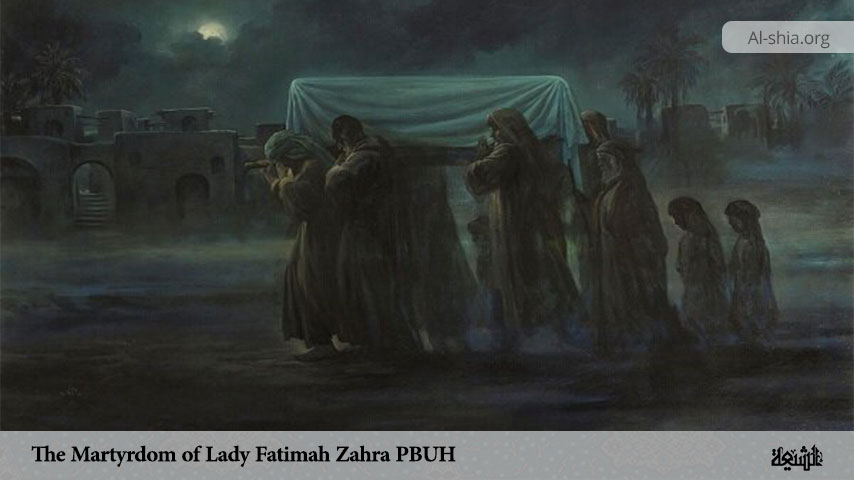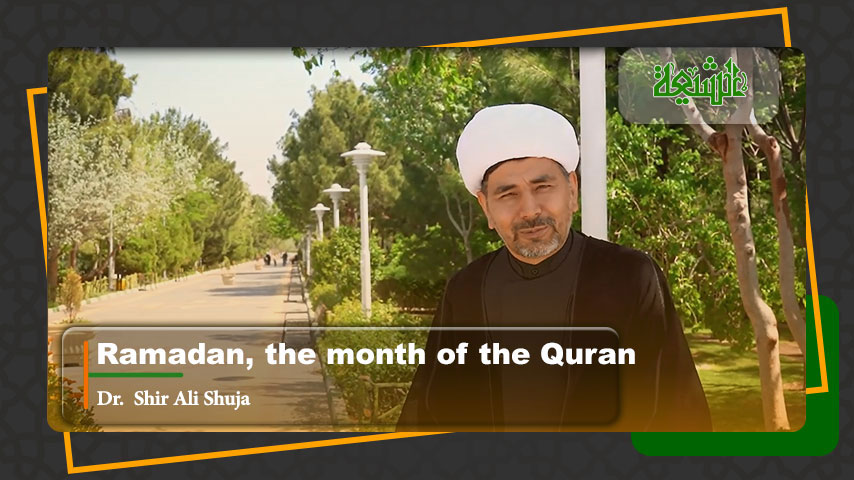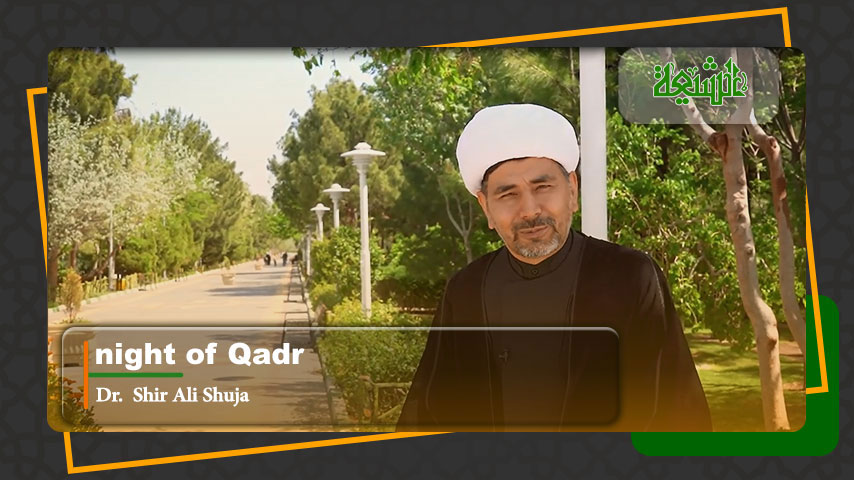Lady Fatimah (PBUH) is a beloved daughter and the only surviving child of the Messenger of Allah. She was also the first person among the members of the Prophet’s pure Household (Ahl al-Bayt) to reunite with him. Her mother was Lady Khadija, the daughter of Khuwaylid who before the advent of Islam, was considered one of the prominent women of Quraysh to the extent that she was called Ṭāhirah (i.e., The Pure) and Sayyidah (i.e., the Chief) of Quraysh women. According to reliable historical reports, the birthday of the Prophet’s daughter [i.e., Fatima] was after his appointment to Prophethood on the twentieth of Jumadah Al-Thani, 5 AH.
It is pertinent to mention that the martyrdom of Lady Fatimah (PBUH) refers to the death of Fatimah, the beloved daughter of the Prophet of Islam (PBUHH) as a result of injuries she suffered at the hands of some of the companions of the Prophet. The issue of the martyrdom or natural death of Lady Fatimah (PBUH) is one of the issues disputed between Shiites and Sunnis. Shiites, despite some differences in the narration of the events after the demise of the Prophet (PBUHH), commonly believe that Lady Fatima (PBUH) was martyred and this event was due to an injury inflicted on to the side of her abdomen and the abortion of her unborn child. On the other hand, the Sunnis believe that she died a natural death due to illness and grief over the demise of the Prophet (PBUHH).
In the tenth year of Hijrah, when the Prophet (PBUHH) returned to Medina from the farewell pilgrimage to Mecca. He invited his daughter and the following conversation happened:
O my daughter! Gabriel used to reveal the Qur’an to me once a year but he revealed it to me twice this year.
O dear father! What does that mean?
I think this year is the last year of my life. Lady Zahra got disturbed and depressed. Tears were dropping from her eyes and her father concluded his speech with this sentence: O my daughter, you will be the first person from my family to join your father!
And a smile was noticed on Zahra’s lips. The audience asked the reason for the tears and then the smiles simultaneously, but Lady Zahra (PBUH) answered shortly after that day (cf: Ṭabaqāt, vol. 8, p. 17; Ṭabari, vol. 3, p. 114; Bihār quoting from Kashf al-Ghummah, p. 15).
After the death of the Messenger of Allah, the members of his Household, including Lady Fatimah witnessed a series of attacks from the Muslim community. The house of Lady Fatimah was attacked and threatened to burn her:
Come out! Come out! Otherwise, we will burn you all! Umar Said. The Prophet’s daughter came out and met Umar who was holding fire in his hand.
O Umar! What happened? What’s going on here? Lady Fatimah inquired.
Ali, Abbas and Banu Hashim must come to the mosque and swear allegiance to the Caliph of the Prophet!
Which Caliph? The designated leader of the Muslims is sitting by the holy body of the Prophet inside Aisha’s house.
From this moment, the [selected] leader of the Muslims is Abu Bakr, Umar replied. The people had pledged allegiance to him in Saqifah of Bani Sā’idah. Thus, Banu Hashim must also swear allegiance to him.
And if they don’t come for the oath of allegiance, I will set the house together with whoever is in it on fire unless you also accept what the Muslims have accepted.
O Umar! Do you want to set our house on fire?
Of course (cf: ‘Aqd al-Farīd, p. 2; Ansāb al-Ashrāf, p. 586).
A few days after the incident, another incident happened. The land of Fadak which had been given to Lady Fatimah by the Prophet during his lifetime was snatched away from her and her husband was roughly handled by the Caliph.
Truly, the death of her most beloved father, the oppression of her husband, the loss of her rights, and above all, the changes that appeared within a very short period in the Muslim culture after the Messenger of Allah deeply hurt the soul as well as the body of Lady Fatimah.
According to reports, it is documented that Lady Fatimah was injured during an attack on her house by the Companions immediately after the death of her father. The Prophet’s daughter now fell sick. When she was visited by the women and the wives of the companions, she complained about the behaviour and attitudes of their men.
How are you, daughter of the Prophet? How are you coping with the illness? The women asked.
Lady Fatimah replied thus: “By Allah, I don’t like your world and I hate your men! I tried them inwardly and outwardly but I am not happy with what they did! [They acted] like a rusted, unsharp blade, and sometimes regressive. They are the masters of dark and inadequate thoughts. They have earned the wrath of Allah and they shall be eternal in the Hellfire.
I had to leave the work to them, and I burdened them with the shame of fighting for justice. Curse be upon these sly people and they shall be kept away from the mercy of Allah, O these oppressors. Woe to them. Why didn’t they let the truth be in its designated place? And the caliphate remained steady on the foundations of the prophethood. The place where the honest Arch Gabriel used to visit. The leadership is put upon the shoulder of Ali, who is knowledgeable about the affairs of the world and religion. Certainly, what they did is a great loss. They did not like Ali because they had tasted the sting of his blade and saw his steadfastness. They had witnessed how he attacked them and did not compromise with Allah’s enemies
I swear by Allah, that if they had done the expected and put Ali in charge of the affairs that the Holy Prophet had entrusted him, he would have gradually led them to the right path. And he would give each one his right so that no one suffers any harm and everyone reaps the fruits of what he has sown. Those demanding justice would be satisfied by the fountain of his virtue and the tongues became brave in the shelter of his authority. If they did that, the doors of mercy from earth and heaven would open for them. But they did not, and soon Allah will punish them for what they did.
Be ready now that the round of calamity was aroused and the blade of Allah’s anger was sharpened by the intention of revenge! He will not leave you until you are out of trouble, then there is no benefit in delaying. He will disperse your gathering and remove your thorn. I’m sorry you don’t know the truth. It is not our fault that you do not like having the right.”
During the last days of her life, Lady Fatimah asked for Asma, the daughter of Umais, who was one of the emigrant women and one of his relatives and said to her: I don’t like putting on a garment over a woman’s corpse but her body is still visible from under the garment. I saw something in Abyssinia, I will show its pattern to you now. Then she asked for some wet branches. He bent the branches. She put on a cloth over it.
The Prophet’s daughter said: What a good thing. It distinguishes a female corpse from that of a male. When I died, you wash me and don’t let anyone come near my corpse (Istī’āb, p. 751; Ṭabaqāt Ibn Sa’ad, vol. 8, p. 18; Ansāb al-Ashrāb, p. 402, Bihār al-Anwār, vol. 43, p. 189).
In the last days of her life, she requested water. She washed her body well, put on new clothes and went to her room. She told her maid to spread her bed in the middle of the pavilion and then she laid down facing the Qiblah, put her hands on her cheeks and said, “I will die this very hour” (Bihār al-Anwār, vol. 43, p. 172 Ansāb al-Ashrāb, p. 402; Ṭabaqāt Ibn Sa’ad, vol. 8, p. 17-18).
According to Shia scholars, her husband Ali (PBUH) washed her. And it seems that Asma had assisted him in the ritual washing of Lady Fatimah (PBUH). Ibn Abd al-Barr documented that at the moment Lady Fatimah left this world, Aisha wanted to enter her room, but Asma did not allow her based on her will. Aisha complained to her father thus: “This Khath’ami woman came between me and the Prophet’s daughter, and she won’t let me go near her corpse. In addition, she made a curtain for her, like the bride’s chamber”.
Abu Bakr came to the door of the Prophet’s daughter’s room and said: Asma, why don’t you let the Prophet’s wives go to his daughter? Why did you make a curtain for the Prophet’s daughter? She replied: Lady Zahra has bequeathed to me not to allow anyone to enter unto her. She showed me the thing I made for her corpse when she was alive and she directed me to make the same for her. Now that it is like this, do whatever she told you.
The Shia Scholars and biographers unanimously agreed that the holy body of Lady Fatimah was buried at night and until the present, the place of her burial is unknown to the Muslim community.
















